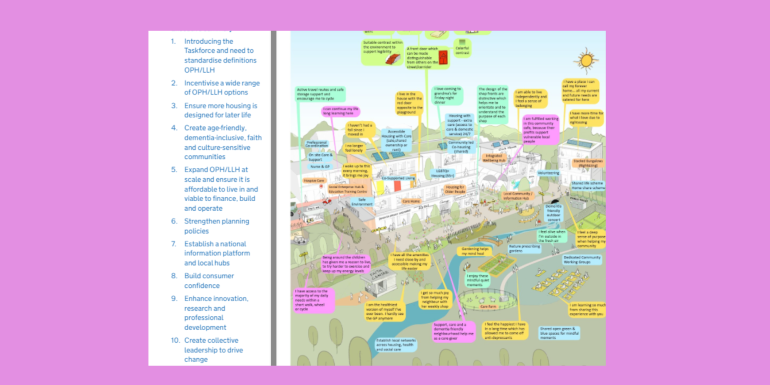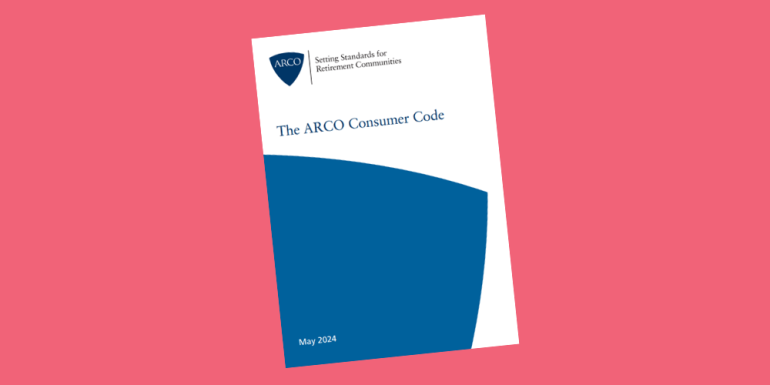Both key Ministers to address Retirement Community conference on the growing importance of housing-with-care in health, housing and social care
Housing Minister Kit Malthouse and Care Minister Caroline Dinenage are due to set out their vision for the key role that housing-with-care can play in the future of the UK health, social care and housing provision at ARCO’s Annual Conference on 10 July.
Ahead of the long-awaited Social Care Green Paper and Ministerial Planning Guidance for Older People’s Housing, both Ministers are expected to shed light on the latest government thinking and to challenge the sector to help meet the social care and housing challenges facing the UK.
The announcement comes a week after the release of the largest and most in-depth research ever undertaken on Retirement Community residents, confirming what the sector and its residents have known for a long time - older people are healthier and more active in specialist housing-with-care.
The Housing Minister is expected to challenge the sector to grow faster over the coming decade, play a bigger role in tackling the housing crisis, improve specialist housing provision for older people and increase its role in health and social care.
In addition, the Care Minister is expected to outline the important role the Government believes the sector can play in the care system, meeting the challenges of delivering more social care to an ageing population and supporting the wider health system.
Michael Voges, Executive Director of ARCO said:
“We are delighted that both of the key Ministers for our sector are addressing this year’s conference. This reflects the growing understanding within Government of the important contribution our sector can make in a range of areas. We look forward to getting an insight into their thinking and to showing them the energy, inspiration and ideas which abound in our sector which will be visible at our conference..”
What Next? 2019 takes place at the Royal Horticultural Halls, London, with sector leaders speaking on where the rapidly expanding Retirement Community is heading and future regulation.
Other topics include new business models in the sector, moving further away from a focus on housebuilding to a one on long-term sustainable operations, and how to deal with increased lifespans if our healthspans are not keeping up, plus many more.
For more details on our line-up of speakers and topics, go to https://www.arcouk.org/conference
ENDS
For Further Information Please Contact
Gareth Lyon, Head of Policy and Communications, at garethlyon@arcouk.org or on 075350 88498
Notes to editors
- About ARCO: ARCO (the Associated Retirement Community Operators) is the trade association for operators of housing-with-care developments for older people. ARCO was founded in 2012, and is now comprised of 27 private and not-for-profit operators of Retirement Communities. ARCO represents approximately 50% of the Retirement Community sector. ARCO sets high standards, and all ARCO members must adhere to the externally assessed ARCO Consumer Code. ARCO does not represent the traditional retirement housing model where there are limited services and no care is available or care homes.
- About Kit Malthouse: Kit was appointed Minister of State for Housing in July 2018 and was previously Parliamentary Under-Secretary of State for Family Support, Housing and Child Maintenance at the Department of Work and Pensions from January 2018. He was elected as Conservative MP for North West Hampshire in May 2015.
- About Caroline Dinenage: Caroline became Minister of State at the Department of Health and Social Care in January 2018 after serving as Parliamentary Under Secretary of State at the Department for Work and Pensions since June 2017. She was Parliamentary Under Secretary of State for Women, Equalities and Early Years at the Department for Education from July 2016 to June 2017 and was elected Conservative MP for Gosport, Stubbington, Lee-on-the-Solent and Hill Head in 2010.
- About Retirement Communities: Retirement Communities typically consist of individual one or two bedroom flats or houses, located in a development with similar properties. Residents have access to a range of services and facilities, which will include optional on-site care, 24-hour staffing, and dining and leisure facilities, and may also include bars, gyms and craft rooms. Retirement Communities are also sometimes referred to as housing-with-care schemes, retirement villages, extra care housing, assisted living, or close care apartments. They sit in between traditional retirement houses (which have less extensive staffing and leisure facilities), and care homes, and can be in urban or suburban locations.
- About Vision 2030: Vision 2030 is ARCO’s vision for 250,000 people to be living in retirement communities by 2030. The vision sets out ten areas of work for the sector in order to achieve this. These are:
- Development of a clear customer proposition
- Effective self-regulation
- Enhanced health and wellbeing
- Intelligent use of technology
- Flexible models of tenure
- Sustainable funding streams
- Sector-specific legislation
- Comprehensive and robust data
- Clarity in the planning system
- A highly trained workforce
- Benefits of Retirement Communities:
- Meeting the needs of an ageing population: Older people need and want choice in their housing for later life. However, at present housing options for older people are limited. Retirement Communities are an important element of housing choice for older people. Developing the capacity of the Retirement Community sector is vital to ensuring that the UK’s housing market is fit to meet the needs of an ageing population.
- Promoting independence, security and wellbeing: Older people living in Retirement Communities are likely to experience lower levels of loneliness and social isolation. A 2014 study by the International Longevity Centre found that 82% of respondents in Retirement Communities said they hardly or never felt isolated, and only 1% often felt isolated.
- Reducing costs and encouraging more efficient use of resources: Residents in Retirement Communities are able to receive specialist care in their homes if needed, enabling them to return home from hospital earlier. They are also less likely to enter hospital. For example, one way in which Retirement Communities improve health is by preventing falls. Retirement Community properties are designed and built with adaptations to support independence and research shows that those living in these specialist homes are between 1.5 and 2.8 times less likely to have a fall than those living in homes without adaptations. This helps to reduce pressure on NHS services. A recent study found that NHS costs were reduced by 38% for those moving into Retirement Community housing and NHS costs for ‘frail’ residents had reduced by 51.5% after 12 months.
- Responding to the housing shortage: Older people moving to a Retirement Community will typically ‘downsize’, freeing up much needed and under-occupied family sized homes. If all those interested in moving into a retirement property were able to do so, research suggests that approximately 3.29 million properties would be released, including nearly 2 million three-bedroom homes.





